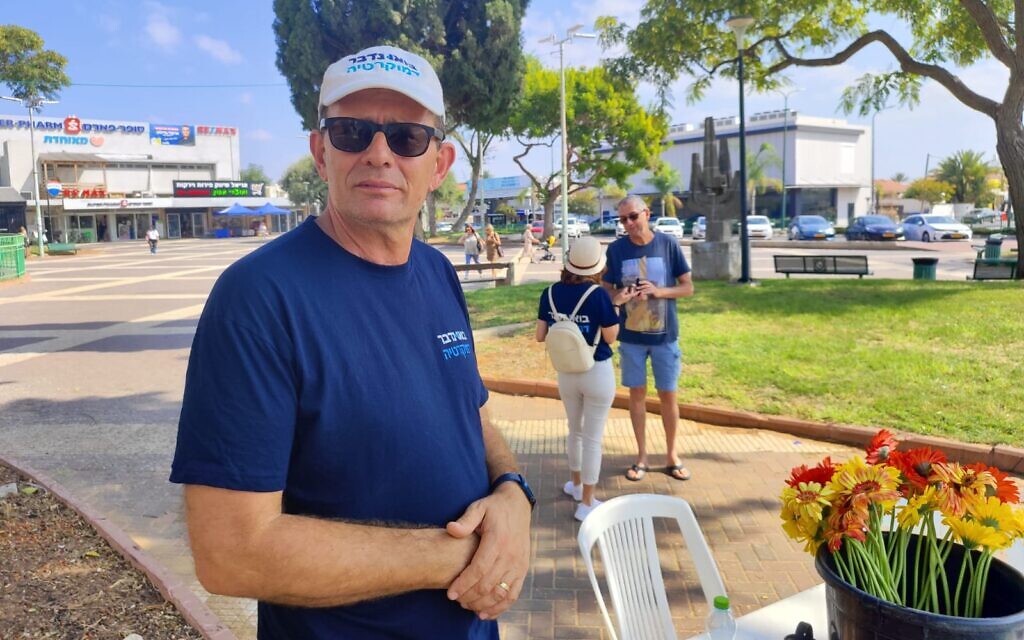A religious Jewish man, kippah on his head and ritual fringes flying, arrives at a table set up by democracy activists in the streets of the northern town of Or Akiva. Repeating the mantra “ahavat hinam” (“boundless love”), he hands out ice cream bars to the citizens absorbed in their discussions and then departs.
That man had probably taken part in a shouting match here, says Eytan Cohen-Munwes, one of the activists. “It happens. It’s great when someone appears who was angry, and then two months later returns and apologizes.”
Cohen-Munwes, a CEO of an aerospace company who moments later helps an elderly woman struggling to get her groceries back to her apartment, is one of a team of volunteers who take to the streets as part of the Bo Nidaber Democratia (Let’s Talk Democracy) movement.
Setting up tables every Friday morning in some 50 locations around the country, the self-described non-partisan group aims to create face-to-face dialogue around secular, democratic, and liberal values in light of the tensions in Israeli society, the government’s judicial overhaul, and the ongoing mass protests in opposition. Bo Nidaber is volunteer-run and accepts donations that go only to equipment and the some 10,000 flowers they buy each month to hand out as conversational icebreakers.
During The Times of Israel’s recent visit to the tables the group had set up in Or Akiva, the atmosphere was largely convivial and friendly, with activists handing out flowers to passersby and inviting them to talk politics. One table was set up in the somewhat run-down central shopping district, and some lengthy conversations did ensue — but many citizens passed by without stopping, busy with their pre-Shabbat purchases.
“People were very upset at the beginning, they cursed and said things I don’t want to repeat. It wasn’t easy,” says Bo Nidaber founder Daphne Haim-Langford. The group’s tables are located intentionally in areas around the country where the population has largely supported Prime Minister Benjamin Netanyahu’s current government.
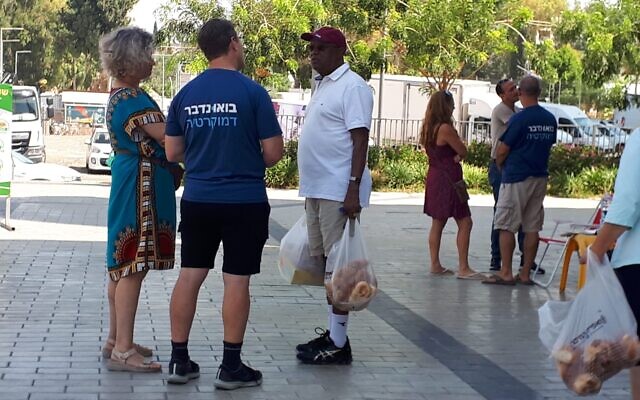
In this undated photograph, activists from the Bo Nidaber movement engage with citizens. (Courtesy)
The eruption of the protest movement in January against the judicial overhaul was galvanizing for Haim-Langford, who realized that for a significant portion of Israeli society “equality and democracy aren’t in the consensus. I had thought it was clear, but suddenly I found that it wasn’t.”
Taking a cue from a Twitter (now X) post suggesting “secular Chabad tables,” a reference to the well-known practice of the Hasidic group putting out tables promoting Jewish religious practices, Haim-Langford organized “five tables within two weeks, 10 within a month, and now we have 50.”
“Instead of handing out [Shabbat] candles, which is important, and instead of tefillin [phylacteries], which is only for half the population, we give flowers and a smile,” she says. The group strives to engage in dialogue with everyone from all walks of life, whether for or against the judicial overhaul, in an effort to “change the consensus, and to do that you have to lower the level of hate [between groups].”
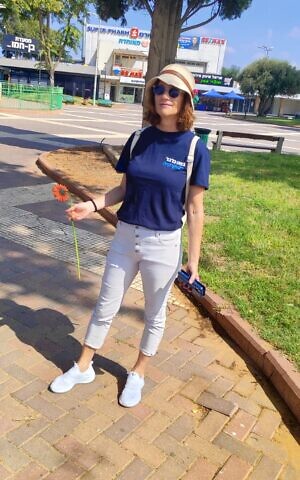
Bo Nidaber’s Daphne Haim-Langford waits to hand a flower to a passerby and engage in political dialogue, in Or Akiva, September 22, 2023. (Gavriel Fiske/Times of Israel)
Haim-Langford, who lives in Zichron Yaakov, has a PhD and founded a pharmaceutical company specializing in treatments for rare eye diseases. Like her and aerospace CEO Cohen-Munwes, many in the Bo Nidaber core volunteer group are entrepreneurs, professors and technology executives who also support the anti-overhaul protests.
However, “the protests have a clear goal, which is to change government policies, and when attending protests you are surrounded by like-minded people,” Haim-Langford says. She explains the project has put the group in personal encounters with Israelis from various walks of life, including the ultra-Orthodox, members of the far-right Otzma Yehudit party, and others with whom dialogue would not have otherwise taken place.
“There can be pushback, but we see it as an opportunity,” says Moshe Katznelson, another volunteer organizer. Sometimes the difficult encounters end with “nothing, or with a hug,” he notes.
On its website (Hebrew), Bo Nidaber stresses that its aim is to engage with moderate members of the public in an effort to find consensus on the problems facing Israeli society. Against this, there are “three powerful forces” which keep people polarized, opines Katznelson.
One is the politicians themselves, who have become more extreme and less connected to the daily lives of the general population; another is the mainstream media — “the most polarizing,” he says — which promotes the stories that sell or draw more page views. The final piece, for Katznelson, is social media, which has created an “algorithmic echo chamber” keeping people locked into certain viewpoints and exposing them to “fake news.”
The face-to-face encounters the organization creates is a way to cut through those obstacles, he adds, and all the volunteers interviewed for this article report a gradual thawing of opinions among the new and returning visitors to their tables, which over the last nine months have become local fixtures.
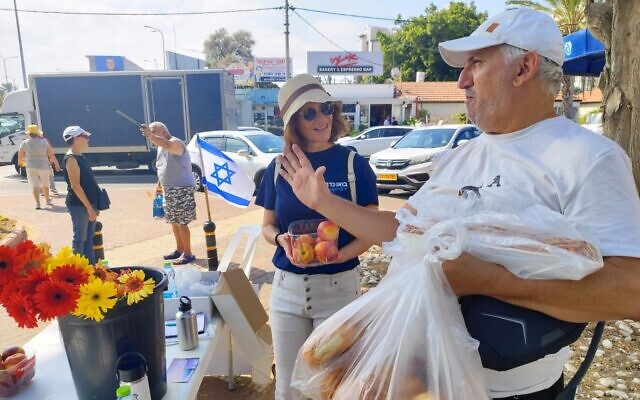
Political dialogue at the Bo Nidaber table in Or Akiva, on September 22, 2023 (Gavriel Fiske/Times of Israel)
Some people have told them that they had voted for one of the parties currently in the ruling coalition, but now regret it, or that they support some kind of judicial reform but not the way it is being done. Others have said that dialoguing with the activists has caused them to change their viewpoint on the protestors and no longer consider them traitors, even if they still don’t agree with them.
One ultra-Orthodox lady, Haim-Langford relates, was astonished to learn how she had sleepless nights from worry while one of her children was serving in the IDF, something the religious woman had “never even considered.”
The process goes both ways. We “have become much more knowledgeable citizens” about the difficulties various groups in the country are facing, especially in terms of economics, education and opportunity, Haim-Langford says. “There is no reason that my child in Zichron Yaakov has more opportunities than one in Or Akiva. We have to speak about this, about racism, which is impossible to ignore.”
Or Akiva is largely populated by working-class Jews of Mizrahi (Middle-Eastern) descent, and Zichron Yaakov is seen as an upscale Ashkenazi tourist town. The issues around political power and opportunities between Ashkenazi and Mizrahi Jews in Israel are complex, and are often seen as an underlying issue behind political currents, with Ashkenazim as the secular “haves” and Mizrahim as the traditionalist/religious “have-nots.”
A similar divide has been reported elsewhere, for example in Kiryat Shmona in the Golan, where Katznelson frequently mans one of the activist tables. There are long-standing tensions between the working-class residents there and the surrounding, mostly Ashkenazi kibbutzim, he says.
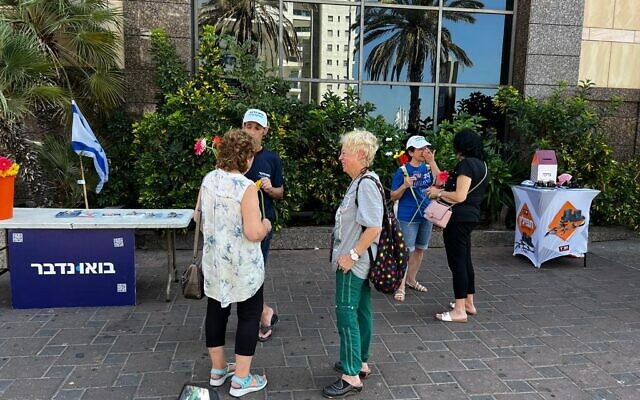
In this undated photograph, activists from the Bo Nidaber movement engage with citizens. (Courtesy)
“Someone was there from a kibbutz, and she sat and listened for the first time… she agreed there is a lack of balance. From the other side, they heard about her for the first time, also,” Haim-Langford relates.
Things aren’t always copacetic at the table in Or Akiva. One lady quickly walked by, saying sarcastically, “You’re promoting democracy,” a reaction which was both bemusing and unsurprising to the activists. In another instance, a man screamed out from a passing car, “Only Bibi, he was blessed by the Lubavitcher Rebbe!” before speeding away. Bibi is the commonly used nickname for the prime minister.
Haim-Langford distances her group from the recent tensions in Tel Aviv around public observance of Yom Kippur, saying Bo Nidaber isn’t interested in “provocations” amplified by subsequent media coverage. What happened there didn’t really affect people outside of Tel Aviv — the “real provocations are government policies” that have shifted funding away from helping remaining Holocaust survivors and other needy citizens, she says.
“We are here for the long term… and have many supporters also from the right,” she adds. “I had an interesting talk with a man from Likud, we were talking about policy… he was also upset about what happened in Tel Aviv. Let’s fix it!”

